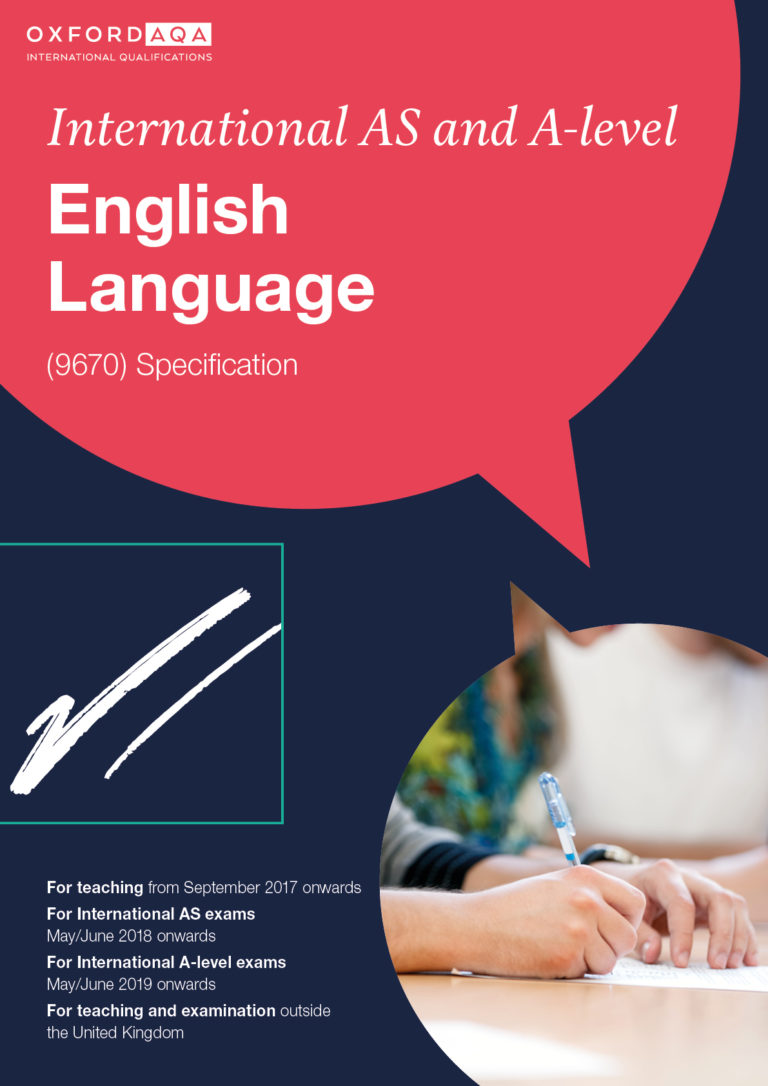
The assessment of this qualification reflects the style of assessment adopted at university level, providing an ideal platform for higher education.
These assessment styles include data analysis, discursive essays, directed writing, original writing and research-based investigative writing. They help students to become excellent critical readers and evaluators of sources.
They also help students to develop and sustain arguments, as well as adopt a number of different writing skills which are invaluable for both further study and future employment.
International AS and A-level English Language (9670)
Unit 1: Language and Context (AS)
Unit 2: Language and Society (AS)
Unit 3: Language Variation (A2)
Unit 4 (exam OR NEA): Language Exploration (A2)
OxfordAQA International AS/A-level English Language covers the following topics:
Language and context
- Section A: Understanding texts
(Understanding context: audience, purpose, genre and mode.) - Section B: Directed writing
(Writing to a specific brief, involving the transformation of some or all of the material in Section A in order to create a new text.)
Language and society
- Section A: Language and social groups: texts
(Understanding the ways in which people use language to: express identities, construct and maintain relationships, mark group membership, claim power and status, and play and entertain themselves and others.) - Section B: Language and social groups: writing
(Developing the skills of academic argument in written language.)
Language variation (A-level only)
- Section A: Learning language
- Section B: International English
Language Exploration (A-level only)
- Written paper (Investigating data)
- Non-Exam Assessment (Researching an aspect of language use)
OxfordAQA provides all the resources and advice you need to teach the International AS and A-level English Language specification effectively.
- Download the specification
- View our training courses to help you deliver OxfordAQA International AS and A-level English Language
- Approved textbooks and resources published by Oxford University Press
We have too many International AS and A-level English Language resources to list here, so please visit our resource area for teachers to see them all, including:
- Schemes of work to allow you to plan how to deliver the specification in a way that will best suit you and your students
- Teaching guidance to outline clearly the scope of teaching and learning
- Topic tests and mock exam analysers to allow you to track your students’ progress throughout the teaching year
This is a modular qualification, with four papers over the AS and A-level teaching period and two routes through the course.
AS Paper 1 – Language and Context:
- Section A – Understanding Texts
- Section B – Directed Writing
- Students answer one question from each section
- 2 hours
- 50 marks
- 50% of AS-level, 20% of A-level
AS Paper 2 – Language and Society:
- Section A – Language and Social Groups: Texts
- Section B – Language and Social Groups: Writing
- Students answer one question from each section
- 2 hours
- 50 marks
- 50% of AS-level, 20% of A-level
A-level Paper 1 – Language Variation:
- Section A – Learning Language
- Section B – International English
- Students answer one question from each section
- 2 hours
- 50 marks
- 30% of A-level
Route A:
A-level Paper 2 – Language Exploration:
- Students answer one question from a choice of two
- 2 hours 30 minutes
- 50 marks
- 30% of A-level
Route B:
Non-Exam Assessment (NEA):
- Students conduct a language investigation
- Assessed by teachers, moderated by AQA
- 50 marks
- 30% of A-level
Re-sits
- Candidates may re-sit a unit any number of times.
- The best result for each unit will count towards the final qualification.
- Candidates who wish to repeat a qualification may do so by re-sitting one or more units.
Take a look at:
- Example specimen exam paper and mark scheme
You must be an approved OxfordAQA centre to enter students for our exams. Make sure you become an OxfordAQA centre before you start teaching a course.
